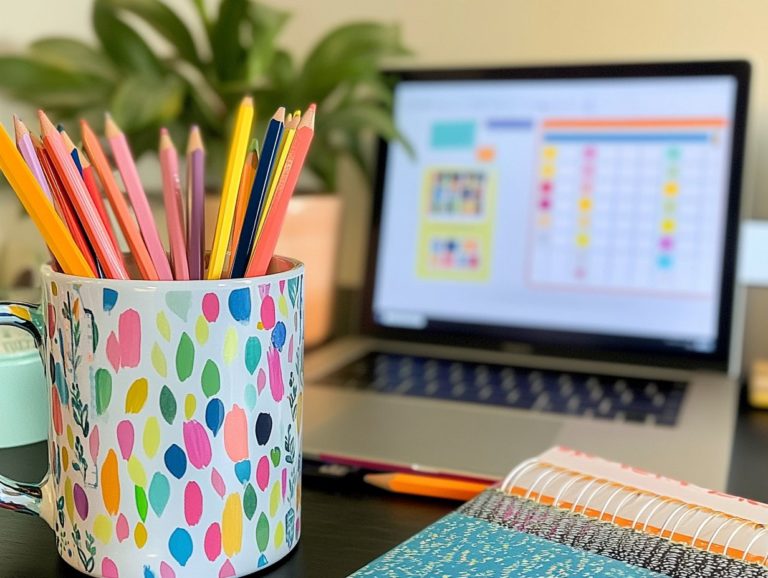5 Daily Practices for Mental Clarity
In today s fast-paced world, achieving mental clarity might feel out of reach, but it’s closer than you think! However, by weaving mindful practices into your daily routine, you can create a profound impact on your mental well-being.
This exploration unveils five transformative habits that will sharpen your mind and elevate your overall well-being. From beginning your day with a touch of mindfulness to reflecting on your experiences at day’s end, each practice is meticulously crafted to declutter your thoughts and cultivate a sense of calm.
Uncover how these straightforward techniques can lead to a clearer, more focused mind, enriching your life in ways you might not have imagined.
Contents
Key Takeaways:

- Starting your day with a mindful activity can set the tone for a clear and focused mind throughout the day.
- Deep breathing exercises help you relax and think clearly, reducing stress and increasing oxygen flow to the brain.
- Taking frequent breaks throughout the day refreshes your mind, allowing for increased productivity and mental clarity.
1. Start Your Day with a Mindful Activity
Starting your day with a mindful activity, like mindfulness meditation, plays a pivotal role in enhancing your mental health and emotional well-being. It sets a positive tone that can carry you through the day.
Engaging in mindful practices fosters emotional resilience, sharpens self-awareness, and strengthens connections with family and friends key elements in nurturing positive experiences. Incorporating simple practices such as deep-breathing exercises or gentle stretching can be remarkably effective.
Just spending five minutes focusing on your breath can help center your thoughts, enabling you to face challenges with a calm mindset. The advantages of mindfulness meditation don t stop at the moment; with consistent practice, you ll likely notice improved emotional regulation and reduced anxiety levels, making you more adaptable when stress comes knocking.
Establishing daily habits like journaling your thoughts or practicing gratitude can further enhance your mental well-being and resilience, creating a solid foundation for navigating life s inevitable ups and downs.
2. Practice Deep Breathing Exercises
Practicing deep breathing exercises is an effective tool for stress relief. These exercises help you relax and think clearly.
You can easily add these exercises into your daily routine perhaps by taking a moment to breathe deeply during a hectic workday or engaging in a focused session before sleep. Techniques like diaphragmatic breathing (breathing deeply from your diaphragm), 4-7-8 breathing, and box breathing provide structured methods to cultivate calmness.
As you develop the habit of incorporating these techniques into your routine, you ll likely notice physiological benefits such as a reduced heart rate and lower cortisol levels, directly enhancing your emotional stability. This simple yet powerful practice not only alleviates immediate tension but also fosters a lasting sense of mental clarity, giving you the power to navigate daily challenges with greater ease.
3. Take Frequent Breaks Throughout the Day
Taking frequent breaks throughout your day is crucial for maintaining mental clarity and boosting productivity. These intervals are vital for reducing stress and refreshing your focus.
When you pause, your mind gets a chance to reset, which improves your overall cognitive function and emotional well-being. By integrating regular breaks into your routine, you enhance your decision-making abilities and cultivate creativity and motivation.
To maximize the benefits of these breaks, consider structuring them with techniques like the Pomodoro Technique, where you work for 25 minutes and then enjoy a 5-minute reprieve. Engaging in light stretches, deep breathing, or simply stepping outside can amplify these rejuvenating effects, paving the way for healthier daily habits and a more balanced emotional state.
4. Declutter Your Physical and Mental Space

Decluttering both your physical and mental space can bring about remarkable improvements in your emotional wellbeing and mental clarity. This creates a serene environment that nurtures focus and sparks creativity.
As you take the time to organize your belongings and eliminate unnecessary items, you ll likely find yourself less distracted and more capable of concentrating. A tidy atmosphere boosts your productivity. It also instills a sense of control over your surroundings.
Research indicates that a clean space can alleviate feelings of stress and anxiety, fostering a more positive mindset. Start your exciting journey to a cleaner mind and space today by dedicating just a few minutes each day to tackle a specific area, like your desk or a corner of your room.
Over time, the cumulative impact of these small efforts can lead to significant enhancements in your emotional resilience and overall happiness.
5. End Your Day with Reflection and Gratitude
Ending your day with a reflection and gratitude practice can significantly enhance your emotional health. It offers a moment of self-care that fosters a positive mindset and bolsters mental resilience.
Incorporating these practices into your evening routine allows you to process your day, celebrating your achievements while also recognizing the challenges you faced. According to Dr. Emmons, a leading researcher in gratitude, expressing thankfulness can lead to heightened emotional well-being and improved relationships with others.
Take just ten minutes tonight! Jot down three things you’re grateful for, along with moments that brought you joy or insight. This can create a powerful shift in your perspective.
This nightly ritual not only helps cultivate a positive outlook but also acts as a buffer against stress and anxiety, making it an invaluable tool for enhancing your overall emotional health.
What Is Mental Clarity and Why Is It Important?
Mental clarity is all about being focused and clear-headed, and it’s absolutely essential for effective problem-solving, emotional support, and overall mental health. This state of mind is a cornerstone of maintaining good mental health.
When you achieve mental clarity, daily challenges become much more manageable. Incorporating daily meditation practices for better focus will help you make better decisions and build emotional resilience in the process.
With mental clarity, you re better equipped to handle stress, nurture healthier relationships, and unleash your creativity, ultimately enriching both your professional and personal life.
To cultivate this important quality, consider incorporating practices like mindfulness meditation, journaling, and taking regular breaks from digital distractions. Engaging with your thoughts and emotions through these awareness techniques can sharpen your mind, leading to deeper insights and more meaningful connections with others.
How Can Mindful Activities Help with Mental Clarity?
Mindful activities, such as meditation and focused breathing, have the potential to elevate your mental clarity by fostering a heightened state of awareness that minimizes distractions and nurtures emotional well-being.
By weaving these practices into your daily routine, you can experience remarkable enhancements in concentration and overall quality of life. For example, dedicating a few moments each morning to meditation provides a tranquil start to your day, allowing your mind to settle and creating a positive atmosphere.
Simple acts like mindful walking where you pay attention to each step and the world around you can cultivate a soothing effect, making everyday life feel more manageable and enjoyable.
What Are the Benefits of Deep Breathing Exercises?

Deep breathing exercises present many benefits for you, including effective stress reduction and enhanced emotional well-being. These techniques can be practiced anytime, anywhere.
These exercises not only cultivate a sense of calm but also activate your body s relaxation response. This can significantly lower your heart rate and blood pressure. Psychologists note that engaging in deep breathing helps shift your focus away from anxiety-inducing thoughts, giving you greater control over your emotions.
Research indicates that regular practice can lead to lasting improvements in your emotional resilience. This equips you to better manage daily stressors. This simple yet powerful technique connects your mind and body, offering a holistic approach to emotional health.
How Can Frequent Breaks Improve Mental Clarity?
Frequent breaks throughout the day play a crucial role in enhancing mental clarity. These breaks offer essential moments for stress relief and mental refreshment.
By taking regular intervals, you can boost your focus and productivity. This allows you to reset your mental state. Research indicates that even short breaks just five minutes can stave off burnout and alleviate mental fatigue, making tasks feel far less overwhelming.
For the best results, try the Pomodoro Technique, a time management method that uses intervals of focused work followed by short breaks. It recommends working for 25 minutes, followed by a refreshing 5-minute break. Engaging in light physical activities during these pauses, like stretching or taking a brisk walk, can further enhance blood flow to your brain.
This combination not only revitalizes your focus but also sparks creativity, ultimately leading to higher-quality work.
What Are the Effects of a Cluttered Environment on Mental Clarity?
A cluttered environment can seriously obstruct your mental clarity. This can lead to elevated stress levels and diminished emotional well-being, making it challenging to maintain focus and productivity.
This overwhelming chaos often distracts you from the tasks at hand. It creates a frustrating cycle of anxiety that can feel impossible to escape. The constant visual reminders of unfinished business can cloud your judgment and sap your motivation, affecting your overall quality of life. To counteract this, adopting effective decluttering strategies becomes essential.
Taking small, manageable steps like dedicating just a few minutes each day to tidying up can transform a chaotic space into a more serene and organized haven. By categorizing items and regularly assessing their necessity, you foster a mindful approach to your surroundings, promoting emotional stability and enhancing cognitive function.
How Can Reflection and Gratitude Help with Mental Clarity?
Engaging in reflection and gratitude practices can significantly enhance your mental clarity. These practices nurture a positive mindset and can be complemented by 5 ways to practice positive thinking daily, promoting emotional well-being.
Research indicates that individuals who routinely express gratitude experience lower levels of stress and anxiety, which can cloud your thoughts. Simple practices like maintaining a gratitude journal or allocating a few moments each day for self-reflection can help cultivate a clearer mental state. Reflecting on your daily experiences allows you to focus on the positives, turning challenges into opportunities for growth.
To seamlessly incorporate these strategies, consider setting aside a specific time each evening to jot down three things you re thankful for. Alternatively, practicing mindfulness meditation allows you to explore your thoughts without judgment, fostering a more centered and focused mind.
Frequently Asked Questions

What are the 5 daily practices for mental clarity?
The 5 daily practices to cultivate mindfulness for mental clarity are meditation, journaling, exercise, getting enough sleep, and maintaining a healthy diet.
How does meditation help with mental clarity?
Meditation allows you to focus on the present moment and let go of distracting thoughts, which can improve your overall mental clarity and reduce stress and anxiety.
Why is journaling beneficial for mental clarity?
Journaling helps organize your thoughts. It also identifies negative patterns and serves as a tool for self-reflection.
What types of exercise are best for improving mental clarity?
All physical activity, from walking to high-intensity workouts, boosts mental clarity. It increases blood flow to the brain and releases endorphins, enhancing your mood and focus.
How does sleep impact mental clarity?
Getting enough sleep is crucial for clear thinking. It allows your brain to rest and repair. Lack of sleep leads to difficulty concentrating and irritability.
Is diet important for maintaining mental clarity?
A balanced diet is key to clear thinking. Fuel your brain with delicious foods rich in vitamins, minerals, and healthy fats for sharper thinking!






